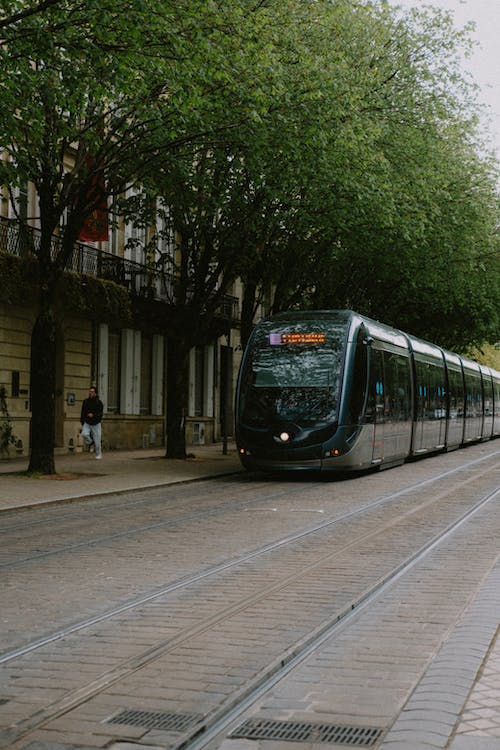By Riccardo Puliti
- The transport sector is responsible for 20% of global carbon emissions yet is often overlooked when tackling climate change.
- Climate-smart transport options tend to be concentrated in the developed world, with low- and middle-income countries seeing a rise in emissions.
- The World Bank urges stakeholders to work together to promote green transport systems to mitigate the impacts of global warming.
No scenario for containing global warming is possible without urgent and distinct action in the transport sector. This is a sector that is often overlooked in the climate equation, but it shouldn’t be. Currently responsible for 20% of global greenhouse gas (GHG) emissions and rapidly increasing, transport is something that impacts everyone, everywhere.
The good news is that the tools needed to curb emissions from transport already exist. Some of them – such as enhanced public transport options, active mobility, zero-emission vehicles, and green fuels – are being implemented in many countries. Global sales of electric cars doubled between 2020 and 2021, reaching 6.6 million vehicles and accounting for nearly 9% of the global auto market.
Green transport concentrated in developed world
But the bad news is that climate-smart transport options are still too concentrated in the developed world. The shift is less tangible in developing and emerging countries.
Simultaneously, GHG emissions from transport in low- and middle-income countries have more than doubled since 2000 and are likely continuing to rise rapidly as motorization and the demand for increased mobility balloons.

The shift to green transport is less tangible in developing and emerging countries. Image: World Bank
If this continues, the world is at risk of explosive growth in transport-related carbon emissions that could be catastrophic for climate action efforts.
Without bucking this trend and bringing transport decarbonization strategies to more developing countries, we also run the risk of creating a “green divide” – a two-tier world where high-income countries benefit from the transition to cleaner, greener, more modern fuels and transport options, while low-income countries remain trapped in the past.

Adopting green transport can reduce the burden of emissions on developing countries.
Action needed to stop green transport divide
One way to prevent the acceleration of this green transport divide is to stop making developing countries a dumping ground for old cars exported from high-income countries.
From 2015-2018, 11 million used vehicles were exported to developing countries from high-income countries, and only 28 developing countries regulate the emissions or safety standards of these dilapidated cars.
As a result, most used vehicles exported to African countries are between 16 to 20 years of age and have more than 125,000 miles on the odometer. This has risky implications for road safety and pollution.
Without serious change, this problem will worsen as low- and middle-income countries expect to double their vehicle fleets – mostly comprised of used, gas-powered cars – in the next 15-20 years.
Benefits of building better transport systems
Another solution is to ensure that cities in developing countries build transport systems that are efficient, safe and inclusive at the outset, rather than trying to retrofit subpar systems later.
The World Bank is actively working with client countries on both challenges – among others — as part of our ongoing and expanding efforts to decarbonize transport in developing countries.
For instance, in Egypt, we worked with the government to turn in, scrap and recycle 45,000 aging taxis, making travel by taxi safer and reducing emissions by 310,000 tons of CO2 over a four-year period. Upgrading fleets in this way can bring decades of benefits by averting long-term commitments to systems based on gas-powered vehicles.
And in cities as diverse as Lima, Abidjan, Dakar and Manila, the World Bank is collaborating with local authorities to create bus rapid transit lines. In the right setting, these can be excellent solutions because they replace congestion-causing private vehicles with cleaner public buses.
Green transport more inclusive and accessible
They also improve connectivity, reduce commute times, and enable more people to gain access to more jobs and critical services – like schools and hospitals. And they connect with other climate-smart modes of transport that are prevalent in developing countries, such as biking and walking.
We know that green transport projects like this can work, are replicable, and help redefine the standard for what’s acceptable in transport. The challenge now is to ensure that there is enough funding to make changes like these universal in developing countries.Discover
How is the World Economic Forum promoting sustainable and inclusive mobility systems?
The World Economic Forum’s Platform for Shaping the Future of Mobility
works across four industries: aerospace and drones; automotive and new
mobility; aviation travel and tourism; and supply chain and transport.
It aims to ensure that the future of mobility is safe, clean, and
inclusive.
- Through the Clean Skies for Tomorrow Coalition, more than 100 companies are working together to power global aviation with 10% sustainable aviation fuel by 2030.
- In collaboration with UNICEF, the Forum developed a charter with leading shipping, airlines and logistics to support COVAX in delivering more than 1 billion COVID-19 vaccines to vulnerable communities worldwide.
- The Road Freight Zero Project and P4G-Getting to Zero Coalition have led to outcomes demonstrating the rationale, costs and opportunities for accelerating the transition to zero emission freight.
- The Medicine from the Sky initiative is using drones to deliver vaccines and medicine to remote areas in India, completing over 300 successful trials.
- The Forum’s Target True Zero initiative is working to accelerate the deployment and scaling of zero emission aviation, leveraging electric and hydrogen flight technologies.
- In collaboration with the City of Los Angeles, Federal Aviation Administration, and NASA, the Forum developed the Principles of the Urban Sky to help adopt Urban Air Mobility in cities worldwide.
- The Forum led the development of the Space Sustainability Rating to incentivize and promote a more safe and sustainable approach to space mission management and debris mitigation in orbit.
- The Circular Cars Initiative is informing the automotive circularity policy agenda, following the endorsement from European Commission and Zero Emission Vehicle Transition Council countries, and is now invited to support China’s policy roadmap.
- The Moving India network is working with policymakers to advance electric vehicle manufacturing policies, ignite adoption of zero emission road freight vehicles, and finance the transition.
For our part, the World Bank has become the largest provider of development financing for transport globally, and across our $31 billion transport portfolio, 75% of projects now include climate co-benefits, which means they directly contribute to reducing countries’ GHG emissions and enhancing climate resilience.
We have also established the Global Facility to Decarbonize Transport in 2021, which is dedicated to accelerating innovation and investment in climate-smart mobility solutions.
Collaboration needed for green transport systems
Transport, like climate change, is not going away. These two areas of global concern are inextricably linked. Right now, we need more stakeholders to join us in our efforts to promote green transport systems.
Our vision is to see more people biking, walking, and using public transport – not as a last resort or for lack of a private car, but because green transport is truly the safer, more efficient, and more accessible option. Join us to make this a reality now.
Link: https://www.weforum.org/agenda/2022/06/green-transport-and-cleaner-mobility-are-key-to-meeting-climate-goals?utm_source=pocket_saves
Source: https://www.weforum.org
















Leave a Reply